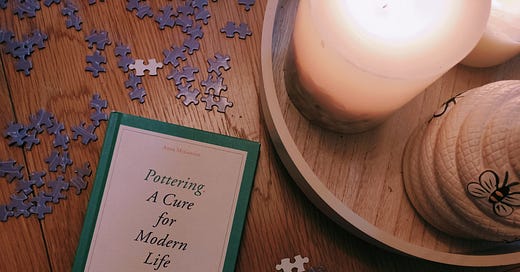This voiceover is an audio version of my Slow Sunday Letter below. It is unedited, so may have some stutters, imperfections, and background noise. I hope you enjoy listening to it anyway!
Welcome to Generosity of Spirit, a space to share my slow and gentle living philosophy. Please do subscribe to join me on this gentle journey of discovery and receive my Slow Sunday Letter straight into your inbox.
Welcome back! I am so happy to have you here as we explore Slow & Gentle Living together as a growing community. In this week’s Slow Sunday Letter, I wanted to introduce you to the notion of ‘pottering’ and how it can be the perfect antidote for overwhelm and help soothe you into a place of calm contentment. I was recently gifted a copy of Anna McGovern’s ‘Pottering. A Cure for Modern Life’ and the book is brilliant. It compliments Slow & Gentle living beautifully- encouraging you to slow down, take pleasure in small things and place value in rest, all while still being productive.
Merriam-Webster defines ‘pottering’ as follows:
potter around/about - phrasal verb
pottered around/about; pottering around/about; potters around/about
: to spend time in a relaxed way doing small jobs and other things that are not very important
He spent his holidays pottering around the house/garden
For Anna McGovern ‘pottering’ is the perfect way to lose yourself and take a mental break. Pottering consists of unplanned and slightly unnecessary activities from which you derive tiny bursts of pleasure. There is so much untapped satisfaction in the mundane tasks that we all do every day. You know that cosy, satisfied feeling when you reorganise your messy drawer, or neatly fold your clothes or sort through some books? That’s the tiny burst of pleasure. She speaks also of the sensory pleasure of pottering, the unpressured and freeing moments it offers and the uniquely restful effect it has on us.
“Often it means spontaneously occupying oneself with something inconsequential: looking out a window, rearranging pencils in a pot, or filling up a bird feeder…sometimes one’s pottering takes a domestic turn: oiling a hinge, sweeping a floor, rearranging a cupboard. At other times, pottering takes you out of the home – down to the shops or popping by a neighbours.”
You may often find yourself ‘pottering’ around the house, engaging in slow moving, homey tasks completed without urgency. Simply moving around, with no real plan- sorting drawers, tidying shelves, putting the washing away, watering the plants. Little mindless tasks that you contentedly move through, from one to the other. After reading Anna’s book I realised that there was a lot of power and influence in this unassuming practice… and it made me want to truly lean into its full potential.
According to a study published in the journal Mindfulness, completing homey tasks, like washing up, can lead to a 27% reduction in nervousness. The focus is on completing simple tasks, free of pressure – tasks that don’t require lot of energy or mental strength. As we gently move through this – it alters our state of mind and we feel empowered, calm, productive and in control.
Anna first discovered the power of pottering when she was going through a period of overwhelm and increasing anxious energy. She felt that she had overcommitted herself and had lost a sense of control over her own time.
“After a period of intensity in my life, I felt I needed some time off and it was incredibly beneficial – more than I ever thought, because I’d given myself permission to have a rest.”
This rest primarily involved Anna booking one day off a week to dedicate to what she soon realised was ‘pottering’. This ‘pottering’ day became precious, restorative, and entirely her own, filled with gentle movement and easy to achieve tasks.
Anna says that pottering is personal, everyone’s pottering days will look and feel different to one another. There is no wrong or right way to potter. It isn’t glamorous and it doesn’t require lots of planning or effort. It could be sewing a button on your shirt, organising your books, weeding your front garden path. There is no benchmark for success, and you are free of judgement when you potter.
When overwhelm sets in, it is important to slow down, and go back to basics. Pottering is just that, a break from the pressure of life – little steps, little tasks and small gestures that soothe and focus. Its slow pace is one of its unique characteristics which set it apart from normal household tasks and procrastination.
“Pottering is guilt-free,” she asserts. “If you have been occupied for a while to avoid doing something necessary and you are beginning to feel guilty, you are procrastinating, not pottering.”
Five Fundamentals to Pottering
We all potter, you probably did today - but did you know that is what you were doing? Did you feel its calming influence on you? Anna encourages focus and intention on the act itself. She explains there are five fundamentals to pottering.





